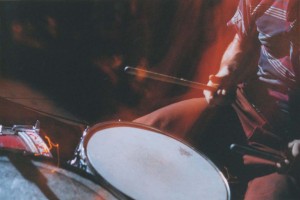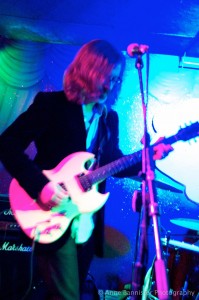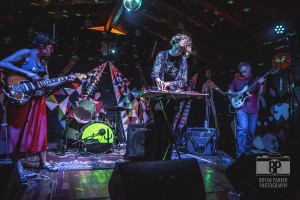Being that we have a few music aficionados (and some practitioners, at that) on staff at the Libraries, we note that we’re once again amid the academic calendar timeout when the students take a (mostly) well-deserved break from classes and the city becomes a mobility nightmare as vectors from the tech, film and music industries converge on Austin to engage in a gathering of equal parts profile building and navel gazing.
South by Southwest is the place where The Next Big Thing is likely to happen, be it the social media juggernaut of the future (Twitter, SX2007), an Academy Award winner (The Hurt Locker, SX2009) or a game-changing musical act (White Stripes, SX2001).
It’s no easy task to break through, though — be it at an annual conference like SXSW, or just as a matter of standing out in a world where technology has been significantly democratized creating a flood of entertainment options. And refining your craft is somewhat easier when your passion is also your job; the tech sector tends to breed its own winners, and industry experience is almost a prerequisite for succeeding in Hollywood. That fact makes being a pure artist an almost Sisyphean undertaking in the modern world.
More often than not, people with creative dispositions need to find jobs among the ranks of the blue and pink collar working set in order to provide income to support themselves through early (or even permanent) periods of anonymity. In New York, fledgling thespians eye Broadway from behind the mirrored windows of cafes as baristas or bartenders. The young and attractive who trek west with eyes on Hollywood make ends meet working as waitstaff in LA’s swankiest hotspots, hoping to cross paths with an industry bigshot. And many visual artists bide their time in production jobs on Grand Avenue in Chicago waiting for their first big gallery show or positive review to launch their career.
So how do musicians who live in the “Live Music Capital of the World” sustain themselves while they hone their art and build an audience? At least one place you might find a featured act in a new music showcase or subject of a glowing Pitchfork review are among the staff in the libraries on the UT campus.
The Libraries have harbored a substantial lineage of musically-inclined talent among the ranks of its past and present staff, mostly in support positions that provide the heavy lifting — both literally and figuratively — of library work. Beloved Austin singer Marcia Ball worked as a clerk at the Collections Deposit Library on the edge of campus in the early 70s. Before he was placing his stamp on the scene with fellow True Believer Jon Dee Graham, Alejandro Escovedo was checking out books at the Perry-Castañeda Library circulation desk. And there’s a virtual catalog of other personalities from Austin’s music scene — both known and supposed — that have some connection to the libraries on the Forty Acres.

How an academic library became a magnet for creatives in Austin makes sense. As the city has grown in fits and starts, much of the wage-earning job opportunities have been in the retail and food service spaces that serve the university community and cater to the student demographic. Likewise, many of the low cost residential rentals have historically been clustered in north and west campus neighborhoods where it provided easy access to campus denizens who didn’t have access to vehicles, or artists who needed to be close to the arts and entertainment venues that afford the best opportunities for exposure. A university community tends to feed the intellectual curiosity of its host city’s population, and those with natural tendencies toward cerebral pursuits, in turn, gravitate to the campus.
Add in an ever-escalating cost of living — especially those costs associated with healthcare — and a university job with its relative security and benefits becomes a much more attractive prospect for an artist who needs income to support their creative habits than most of the other wage-based options available.
Then again, some folks just wind up here because they love the books, or the people, or the place.
Several past and current staffers who also happen to be musicians have offered perspectives on why they landed work at the library, and how that connection impacted their music.
Glen Worley

A veteran of the Austin music scene, Glen Worley has been guitarist/vocalist for The Rattlecats (1979-83), The Rivals (1984-86) and, currently, The Soulphonics (2007-today), in a career that has spanned over 30 years.
“Like many Austin musicians back in the late 70s and early 80s, I got a job at UT because you could work half-time and still get benefits,” says Worley. “I needed a job with flexibility because of the band stuff, and most of the library staff understood that. Since I worked half-time, I could often work ahead and then take off a day or so if the band had a gig out of town.”
“My first job in the Library was working on the Latin American Collection microfilming project and then I wound up processing incoming Latin American monographs in Acquisitions at PCL,” Worley recalls. “I would make photocopies of interesting art that I saw as I was working and use that art when making flyers and promo stuff for my bands.”
%CODE8%
“Flexibility was very important. Sometimes a gig appeared at the last minute and you either took it, or never got asked again. I also got to listen to a lot of music since the Fine Arts Library was buying a lot of music.”
Worley began working at the Libraries at a time when another notable Austin musician was covering the desk at the Perry-Castañeda Library. “Alejandro Escovedo worked at PCL Circulation when I first started working for the Libraries in 1983. We used to wave at each other when I came in the door.”
Worley retired in 2013 after over 30 years in various jobs at the Libraries, and the job itself may have added to his own longevity. “Working in an environment composed primarily of college-age people kept my outlook on life a bit fresher than if I had worked at someplace else.”
Whit Williams

Harold Whit Williams was guitarist and vocalist guitar-driven pop quartet Cotton Mather (1991-2003), and has been working in libraries since his college days, now at the Life Science Library in the Tower.
“I grew up in a Methodist musical family in Muscle Shoals, Alabama. My first library job occurred later, in college,” recalls Williams. “My father alerted me to that first job. I was still living at home and commuting to the University of North Alabama. I had worked summer jobs before — pizza joints and the like — but he figured the library was more my speed, and, of course, he was right.”
Due to the relative success of the 1997 Cotton Mather album Kon Tiki, Williams saw a lot more of the road when the band was on tour. “I would have to leave town for long stretches with the band. But I always liked coming back to the peace and quiet, the predictable day-to-day tasks of a library, as a break from the noisy and unpredictable life of a musician on the road.”
%CODE1%
Williams’s creative side extends beyond music, and having the libraries job has made it possible for him to explore his interest in the written word. He has garnered praise for his poetry, which is both a catalog of his experience as a musician, and reflective of his southern heritage. His most recent collection of poems, Backmasking, earned Williams the 2013 Robert Phillips Chapman Poetry Chapbook Prize from Texas Review Press, and his poem “Blues Dreams,” received the 2014 Mississippi Review Poetry Prize.
“A lot of my musician friends do music full-time, and they sometimes find themselves living hand-to-mouth. I’ve never quite been able to make that leap into the full-on starving artist life,” says Williams. “The flip side is that I don’t have as much time to promote my music, or poetry, holding down a day-job. But it’s a trade-off I’ve lived with thus far.”
“The library most definitely influences my songwriting lyrics, and of course my poetry,” he continues. “Any and all information, from bizarre scientific journal material to random conversations overheard, all of this can be filtered one way or the other into song lyrics or a poem – then names changed to protect the innocent, of course….”
“The library didn’t facilitate any career connections that I can think of,” says Williams, “but it provided dozens and dozens of little instances along the way — I’m sure of it — that changed me musically.”
Carolyn Cunningham

Though a professional librarian, Collections Administration Librarian Carolyn Cunningham has always been a drummer at heart.
“I started playing percussion in 6th grade band, and, with the exception of a few slow periods, have been playing ever since,” says Cunningham.
Carolyn began working at the libraries as a graduate research assistant in the reference unit while still in the iSchool. At the same time, she was continuing to indulge her music both as a member of the UT Brazilian Ensemble and as the rhythm section for psychedelic indie pop outfit Pillow Queens.
Cunningham transitioned from student worker to full-time staff in 2008, but in spring of 2010, she got an offer to go on tour with Woven Bones, a garage band that was making waves in critical circles, and decided to put her professional library career on hold to take her drumming on an extended tour.
%CODE2%
“It was a really tough decision,” relates Cunningham of choosing to go on tour. “Coming back to the library profession was always the idea, and I knew it was a huge gamble quitting my job.”
Cunningham did eventually find her way back to UT in 2013, taking over as Social Sciences Librarian, and she has since contributed her rhythmic talents to several other bands, including Moonsicles, Bell Labs and, most recently, High Wasted.
Cunningham finds balance in an almost symbiotic relationship between the library and her music. “One benefit is kind of cosmic, the other is extremely practical. I am enriched by the ideas that I encounter every day at the library, and that certainly informs my playing and the energy that I bring to a practice or performance,” she says. “On the practical side, a 9-5 job at the library gives me a lot of mental space outside of work time to do what I want to do creatively.”
Elise Nacca
When Elise Nacca joined the Libraries from New Haven, Connecticut, the other half of her band remained behind.
Nacca moved to Austin — eventually becoming the Learning Librarian for UT Libraries — but maintained a long-distance creative relationship with multi-instrumentalist and songwriter Jason Bourgeois, the other co-founder of their indiepop band Bourgeois Heroes.
%CODE3%
Nacca has used her experiences working in libraries to the advantage of her music going all the way back to her undergraduate days. “I started library work as a sophomore in college,” recalls Nacca. “I spent most of my desk shifts scouring eBay for records or looking up arcane information about bands on discussion boards and allmusic.com.”
“When I tell people I’m a librarian, many assume I read books all day. Well, as a 20 year-old, I assumed the same thing, so I thought a job at the library was ideal,” she says. “And, frankly, as a student worker, I did read books all day.”
In her case, Nacca’s work at a library was a source for an artistic partnership. “I met my only musical collaborator while working at my undergrad library. We used our ample free time at the desk and out shelving to discuss important band decisions, such as what to wear, how to answer questions from the press and how many pinback buttons to make.”
Other notable musicians who are alumni of the libraries at UT:
Ismael Ricardo Archbold, Briscoe Center for American History, Collections Deposit Library (CDL) and Library Storage Facility (LSF) – Coma In Algiers, Art Acevedo, Frank Burns Institute, bloody knives, Charles Potts Magic Windmill Band
Joseph Arnone, Perry-Castañeda Library (PCL) Maps – Mermaids, Charming Snakes, Band of Horses
Geoff Bahre, UT Libraries Facilities – The Threshold Effect, The Hostage Heart, The Anchorline, Halfway to Avalon, Kids Icarus
Marcia Ball, CDL – Gum, Freda and the Firedogs, solo
Suzanne Bishop, PCL Acquisitions – The Motards, Pink Swords, The Hatchbacks, The Bad Apples
Joshua Case, PCL Maps – The Glorious Revolution
Benjamin Cissner, PCL Maps – solo
Walter Daniels, PCL – Jack O’Fire, ’68 Comeback, the Hard Feelings, the Crack Pipes
Alejandro Escovedo, PCL Circulation – The Nuns, Rank and File, True Believers, solo
%CODE4%
Michael Gerner, PCL Receiving – Carbomb, The Prima Donnas, 100 Watt Clock, Tune In Tokyo, VietNam
Paul Giigglliioottii, PCL – Traffic Pattern
Robert B Gonzales, PCL Receiving – Falfurrias, Fun Machine
Lauren Gurgiolo, PCL – The Dialtones, The Dead Left, Okkervil River
%CODE5%
Adam Hatley, Fine Arts Library (FAL) – Boss Eye, Those Peabodys, Bangaar
David Head, PCL Periodicals – Motards
Dean Hendrix, Kuehne Physics Mathematics Astronomy Library (PMA)– Hottie ‘78
John Henley, UT Libraries Accounting – solo
Paul Johnson, FAL – Motards
Tim Kerr, PCL, FAL – Big Boys, Poison 13, Lord High Fixers, Monkeywrench
%CODE6%
Anna Lamphear, UT Libraries Conservation –Mongo Like Candy, Bloody Fingertips, Connie Ball, Chablis, Suspirians, Skeleton Krewe Drum Corps, Palit
Kan Manivong, PCL Cataloging –The Reclusives, Teen Cool, Eastside Suicides
Amy Lusk Marsh, PCL Receiving – Page 5 Gurl, Mangyna
Craig McCaffrey, FAL – Multitude of the Slothful, Paul Newman
David McDow, PCL Receiving – Ed Hall (road manager)
Clint Newsom, PCL Maps – Harry Sands, Rhythm of Black Lines, The Hades Kick
David Nolan – Harry Sands
Jon Rueter, PCL – The Prima Donnas
Ernest Salaz, Tarlton Law Library – Glorium, VVV, Electric Skull, I Love You but I’ve Chosen Darkness
%CODE7%
Kiki Solis, PCL Receiving, FAL, InterLibrary Services – Rhythm of Black Lines, Knife in the Water, Kiki and the Kites, Kid Congo and the Pink Monkey Birds
Paul Stautinger, PMA – Desafinado
Barry Stone, PCL periodicals – johnboy, Desafinado
Paul Streckfus, Mallet Chemistry Library (MCL), Classics Library, PCL, FAL, Benson Latin American Collection, and Public Affairs Library – Glorium, Kingdom of Suicide Lovers
Jonathan Toubin, Mallet Chemistry Library (MCL) – DJ
Tim White, PCL Receiving – Salute the Curse, I Love You but I’ve Chosen Darkness
Aaron Winslow, Undergraduate Library (UGL) & Perry-Castañeda Library – Desafinado
The Libraries have just launched a campaign through the university’s Hornraiser crowdfunding platform to support the construction of a new recording studio in the Fine Arts Library. The studio will be open to all students — even those not enrolled in a music program — and will be part of a broader creativity commons at the library to provide future generations of Longhorns at UT with the tools they need to create and produce music, voiceovers, vocal narration, and other audio recordings, and possibly make their own mark in the music industry.
Please support the recording studio at the Fine Arts Library by making a contribution.
%CODE9%
If you are a musician who worked at the University of Texas Libraries (or General Libraries), know someone who did but wasn’t included here, or just have a related story that you’d like to share, tell us about it in the comments section.
Katherine Strickland contributed to this article.


Great history here! Tim Kerr, the Motards, I’ve Love You But I’ve Chosen Darkness–the library can rebrand itself as a “creatives incubator” for I am sure there are many other artists working among your staff.
Peter Keane
Thanks for this great article.
Former cataloger of Latin American materials, current translator and music archivist at Briscoe Center for American History. Bands since 1964: Austin Symphony, UT Collegium Musicum, UT Symphonic Band, UT Brazilian Ensemble, Unidos de Austin, Toqui Amaru, Sambaxé, Austin Samba (Academicos da Opera).
Former information desk clerk at the Center for American History, November 2002 to May 2006. Performed solo in Austin since 1995, and in bands The Lambs, Hurt a Fly, This Dog’s a Lion, Dying and Rising, Anonymonstrosity, and many others. Have played (and set up) shows with at least eight of the bands mentioned in this piece.
[correction: November 2002 to May 2007]
Thanks, Steve. I think we omitted some of our friends at the special collections around campus that aren’t under the UT Libraries umbrella, and we need to reconcile our list to include folks like yourself, Peter Keane, John Wheat and others. Duly noted.
Thanks for this. Hanging out in the creative salon that was Jim Kieke’s PCL mailroom in the mid-90’s was truly a great experience — with Tim Kerr, Amy Lusk, PG Moreno, Mike Gerner and the rest of the gang… and whatever random musicians happened to stop by. I learned how to do graphic design, hands-on, while working in the Periodicals room… cutting and pasting together gig posters from limitless raw materials xeroxed from the stacks. That ended up having a greater effect on the course of my life than my official education at UT — or the band stuff — oddly…
That’s a great story, David. Boris Brodsky told me of “the bands that never were” created in the mailroom. Maybe we’ll do a sequel to this focusing just on the history of that unit.
Thanks!
Loved the article. Definitely a lot of interesting stuff I hadn’t known about.
I’m still a lowly GRA at the FAL (really the CDL ), but I’ve played with the Gloria Record, A. Sinclair (ne Frank Smith), and many others. I’ve shared a practice space with Clint and Kiki, and been on tour with Lauren’s band, Okkervil River, playing with Zykos, whom they had named a fictionalized song and consequent tour after – ‘On Tour with Zykos.’ I’ve played SXSW every year but two since 1998 – and at least twice had southby shows shut down by the fire marshall. Yadda yadda…
I worked in the fine arts library and still work at UT at web guy for the Division of Diversity and Community Engagement. Have been playing continuously as a singer/songwriter around town and doing my lunchtime concerts around campus.
Find my music at jasonmolin.net. Let me know if you want to be on the list for lunchtime concerts: jmolin@austin.utexas.edu. I play Fridays when the weather is perfect.
BTW: Nice job compiling the only list I’ve ever seen of musicians at UT… have been wanting to make/see one for a long time!
I’m not a musician, but I worked at the UT library at PCL in
Interlibrary loan. I worked April 85-Aug. 87. Sometime in my first few weeks I met Alejandro Escovedo. My boss said to me,
“you’re the new Alejandro”. I doubt if he would remember me now, but it’s a moment I still treasure.
Michael Laman